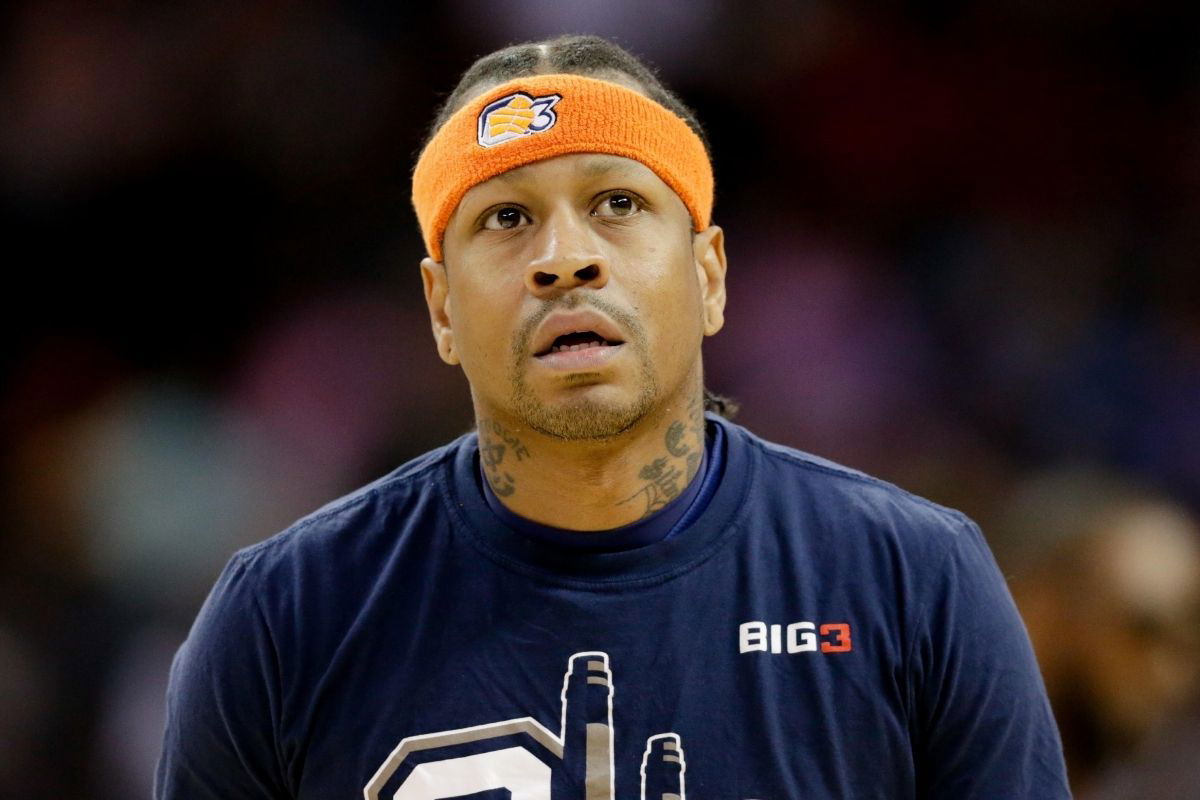
USA Today via Reuters
Jul 2, 2017; Charlotte, NC, USA; 3’s Company player Allen Iverson (3) stands on the court prior to the game against the Ghost Ballers at Spectrum Center. Mandatory Credit: Jeremy Brevard-USA TODAY Sports

USA Today via Reuters
Jul 2, 2017; Charlotte, NC, USA; 3’s Company player Allen Iverson (3) stands on the court prior to the game against the Ghost Ballers at Spectrum Center. Mandatory Credit: Jeremy Brevard-USA TODAY Sports
If you’re a die-hard Allen Iverson fan, you’d already be familiar with the stories packed into about 100 pages of his memoir, Misunderstood, covering his days with the Sixers. But if you really want to understand the parts of his life that were often misunderstood, the book is worth picking up. Iverson opens up about his early years in Virginia, living with his great-grandmother, and the people who helped shape him.
Watch What’s Trending Now!
So let’s dive into one story from his high school days that truly shaped his personality, his life, and his career.
ADVERTISEMENT
Allen Iverson’s early life and high school career
Allen Iverson was born on June 7, 1975, in Hampton, Virginia, and to say that he lived a difficult life is an understatement. His mother, Ann, was just 15 when she gave birth, and his father wasn’t part of the picture.
They grew up in hampton projects where the apartment sat atop the city’s sewage system, and when the pipes burst, the floor would flood, leaving a stench in the home. Money was always tight, and sometimes meals weren’t guaranteed.
Top Stories
Steve Kerr Explains the Problem With Jonathan Kuminga After Tanking His Trade Value
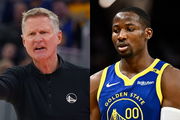
Jimmy Butler Shows No Mercy to Warriors Teammate After Humiliating Moment vs Kings
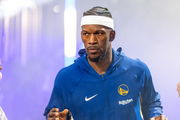
Is Victor Wembanyama Dating Khloe Kardashian? Fact-Checking Viral Post About Spurs Star
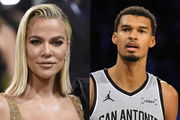
“Shameful”: Steve Kerr Issues Strong Statement on Fatal Minneapolis Shooting
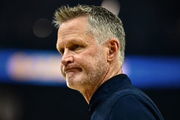
Giannis Antetokounmpo Can Save Stephen Curry’s Warriors as Steve Kerr’s Job Hangs in Balance, Per Insider
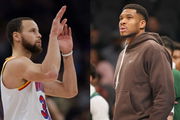
Despite these hardships, Allen’s athletic talent shone early. He played both football and basketball throughout his school years, excelling at both. In football, he became a junior quarterback sensation at Bethel High School, leading his team to a Virginia state championship.
ADVERTISEMENT
But basketball was where he truly made his mark. At his mother’s urging, he focused on hoops and quickly became unstoppable. By 1993, Iverson was averaging 31 points, 11 rebounds, and 9 assists per game, earning the Associated Press High School Player of the Year award.
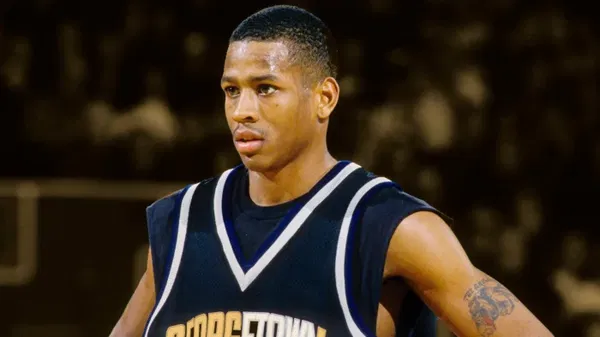
USA Today via Reuters
Mandatory Credits: RVR Photos-USA TODAY Sports
But things quickly changed on Valentine’s Day in 1993, when Iverson found himself caught up in a brawl at a local bowling alley with friends, a reminder of the challenges and environment he grew up in.
ADVERTISEMENT
The Hampton bowling alley brawl–What actually happened?
It was in 1993 when Allen Iverson first appeared on television headlines, involved in a serious incident at a bowling alley in Hampton, Virginia. On February 14, 1993, Iverson, then 17, was out with friends when an argument broke out between their group and several white teenagers at the alley.
ADVERTISEMENT
The situation escalated into a fight, and Iverson was accused of striking a young woman with a chair. While there were conflicting reports about who actually started the fight, and the surveillance video was unclear, Iverson and three of his friends—Melvin Stephens, Samuel Wynn, and Michael Simmons—were the only ones arrested.
Iverson was charged under Virginia’s “maiming by mob” statute, a law rarely used and originally intended to combat lynching. Furthermore, during the trial, the judge, coming from a conservative part of southeast Virginia, showed very little understanding or compassion for Iverson’s upbringing or his basketball talent.
Two eyewitnesses claimed they saw him hit the woman, and the fact that Iverson had flown in from a basketball tournament that weekend worked against him in the courtroom. He was sentenced to 15 years in prison, with 10 years suspended, even though no one involved in the fight had been seriously hurt.
ADVERTISEMENT
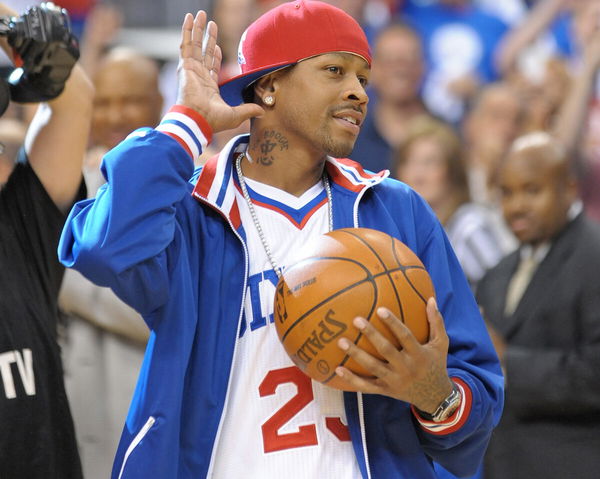
USA Today via Reuters
May 23, 2012; Philadelphia, PA USA; Philadelphia 76ers former guard Allen Iverson before the start of game six against the Boston Celtics in the Eastern Conference semifinals of the 2012 NBA Playoffs at the Wells Fargo Center. Mandatory Credit: Eric Hartline-USA TODAY Sports
After spending four months at the Newport News City Farm correctional facility, Iverson was granted clemency by Governor Douglas Wilder. The Virginia Court of Appeals eventually overturned his conviction in 1995, ruling that there was insufficient evidence to support the charges.
The incident and its aftermath were later chronicled in the 2010 ESPN 30 for 30 documentary No Crossover: The Trial of Allen Iverson, which explored how the event divided the town and shaped Iverson’s early life.
ADVERTISEMENT
The trial and controversy around his conviction
The 1993 bowling alley incident didn’t just put Allen Iverson in legal trouble but it exposed deep tensions in Hampton.
His high school coach even said, “They wanted to make an example out of Iverson.” Further, Iverson’s decision to request a bench trial and fly in from a weekend tournament only fuelled the perception that he didn’t respect the law.
ADVERTISEMENT
The case drew massive national attention and became a rallying point for many who saw the punishment as unjust. Rallies and marches were held in support of Iverson and his friends, and figures like Tom Brokaw, Bill Cosby, and Spike Lee amplified the conversation.
Brokaw even interviewed Iverson in jail, calling the sentence “surprisingly harsh.” After spending four months behind bars, Iverson was granted clemency by Governor Douglas Wilder, a decision that sparked further controversy.
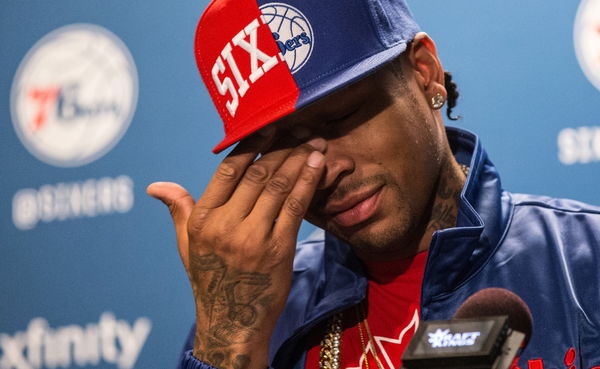
USA Today via Reuters
Apr 8, 2016; Philadelphia, PA, USA; Philadelphia 76ers legend Allen Iverson wipes tears away as he talks about his selection for enshrinement in the Naismith Memorial Basketball Hall of Fame as a member of the Class of 2016 during a press conference at Wells Fargo Center. Mandatory Credit: Bill Streicher-USA TODAY Sports
The episode left a lasting mark on Iverson’s early life, highlighting not only the challenges he faced growing up but also the ways racial dynamics shaped public perception of him. “I just try to be as strong as I could,” Iverson said.
ADVERTISEMENT
“It was tough for me when I got locked up because people wouldn’t let it go away. It was in the paper for a month or two straight. It was on TV every day, people was rallying, meeting in churches and things like that.”
Impact on his athletic career and college recruitment
After the 1993 bowling alley incident, Allen Iverson’s future seemed uncertain. He couldn’t accept a scholarship to the University of Kentucky at first, but his mother, Ann, never gave up on him. She visited Georgetown coach John Thompson in December 1993 while Allen was still in jail, pleading for a chance for her son. “She was the reason why I helped her child,” Thompson later said.
By spring 1994, Thompson visited Iverson at Hampton’s Richard Milburn High, a school for at-risk students, and convinced him to take a scholarship to Georgetown. It was during this time that Iverson earned his famous nickname, “The Answer,” because his friends said he was the answer to basketball’s conformity, unlike players who fit the typical mold, like Michael Jordan, Charles Barkley, and Isiah Thomas.
At Georgetown, Iverson thrived. He was an All-American as a sophomore and led Georgetown to the regional finals of the NCAA Tournament. By May 1, 1996, he declared for the NBA draft, becoming the first player in Georgetown history to leave school early for the league. The Philadelphia 76ers picked him first overall.
His rookie season proved they had made the right choice: 23.5 points, 7.5 assists, 4 rebounds per game, 14 double-doubles, and a Rookie of the Year award, all while putting on some unforgettable performances, including scoring 40+ points in five consecutive games.
The aftermath–How Iverson overcame his past?
Despite the troubles, AI rose like a phoenix. In 2001, Allen Iverson made a huge impact on the Philadelphia 76ers, winning the regular season MVP and taking the team all the way to the NBA Finals. Over his 17-year career, he was picked for eleven All-Star games, scored more than 24,000 points, passed out over 5,000 assists, and earned seven All-NBA honors.
He also led the league in scoring four times and brought a cool, hip-hop style to the NBA, showing players they could be themselves both on and off the court.

Imago
Apr 25, 2024; Philadelphia, Pennsylvania, USA; Former Philadelphia 76ers and hall of fame member Allen Iverson reacts after a 76ers score against the New York Knicks during the second half of game three of the first round for the 2024 NBA playoffs at Wells Fargo Center. Mandatory Credit: Bill Streicher-Imagn Images
Off the court, he renegotiated his Reebok contract in 2001, securing $800,000 annually for life and a $32 million trust fund for his 55th birthday. Today, with an estimated net worth of $1.2 million in 2025, Iverson sits as the vice president of Reebok, continuing to chase greatness in a different arena.
Through it all, Iverson never forgot those who believed in him. Years later, after Thompson’s passing, he shared a heartfelt tribute on social media:
“Thanks For Saving My Life Coach. I’m going to miss you, but I’m sure that you are looking down on us with a big smile. I would give anything just for one more phone call from you only to hear you say, ‘Hey MF’, then we would talk about everything except basketball…….May you always Rest in Paradise, where there is no pain or suffering. I will always see your face in my mind, hoping that I made you proud. ‘Your Prodigal Son’. #Hoya4Life.”
From a challenging childhood to NBA superstardom, Allen Iverson’s journey is a story of resilience, talent, and unapologetic self-expression.
ADVERTISEMENT
ADVERTISEMENT
ADVERTISEMENT

